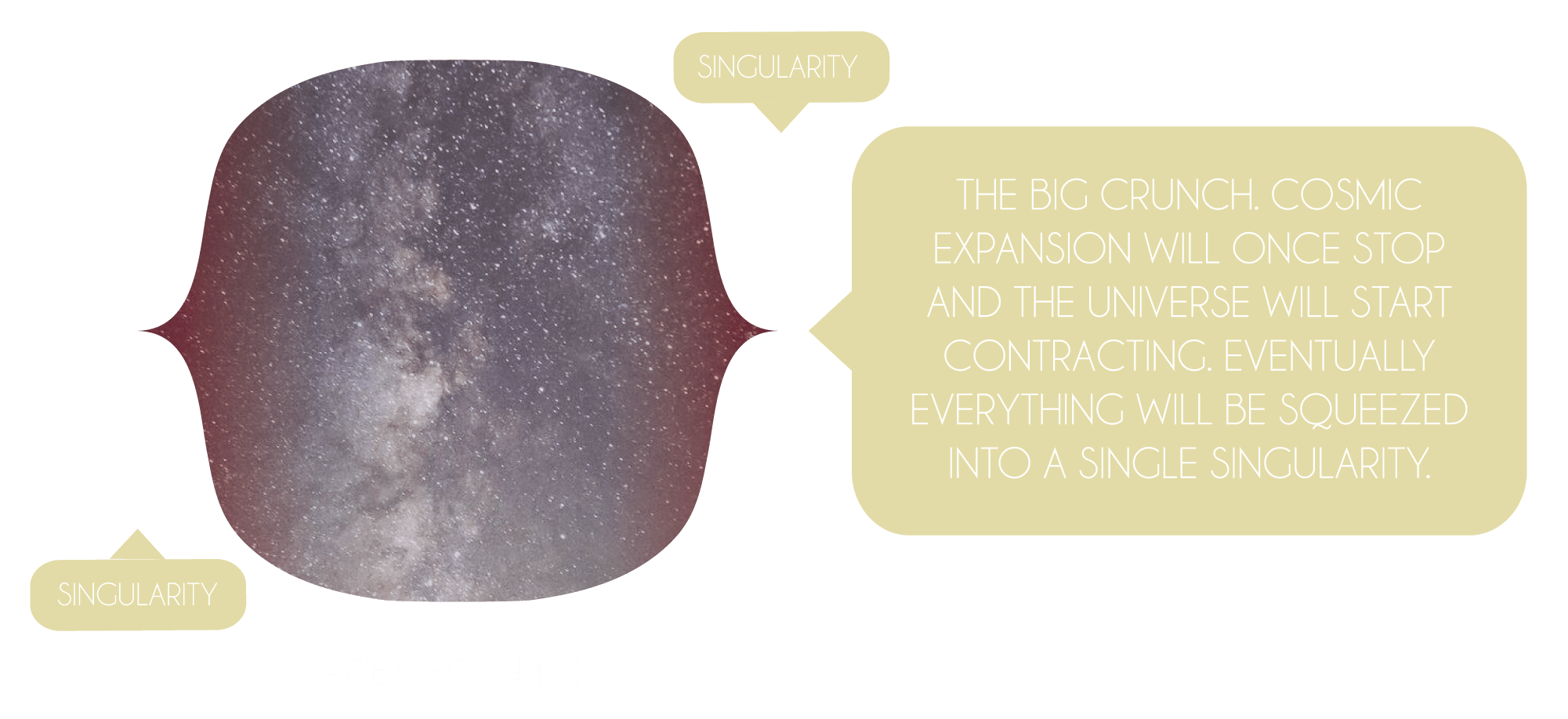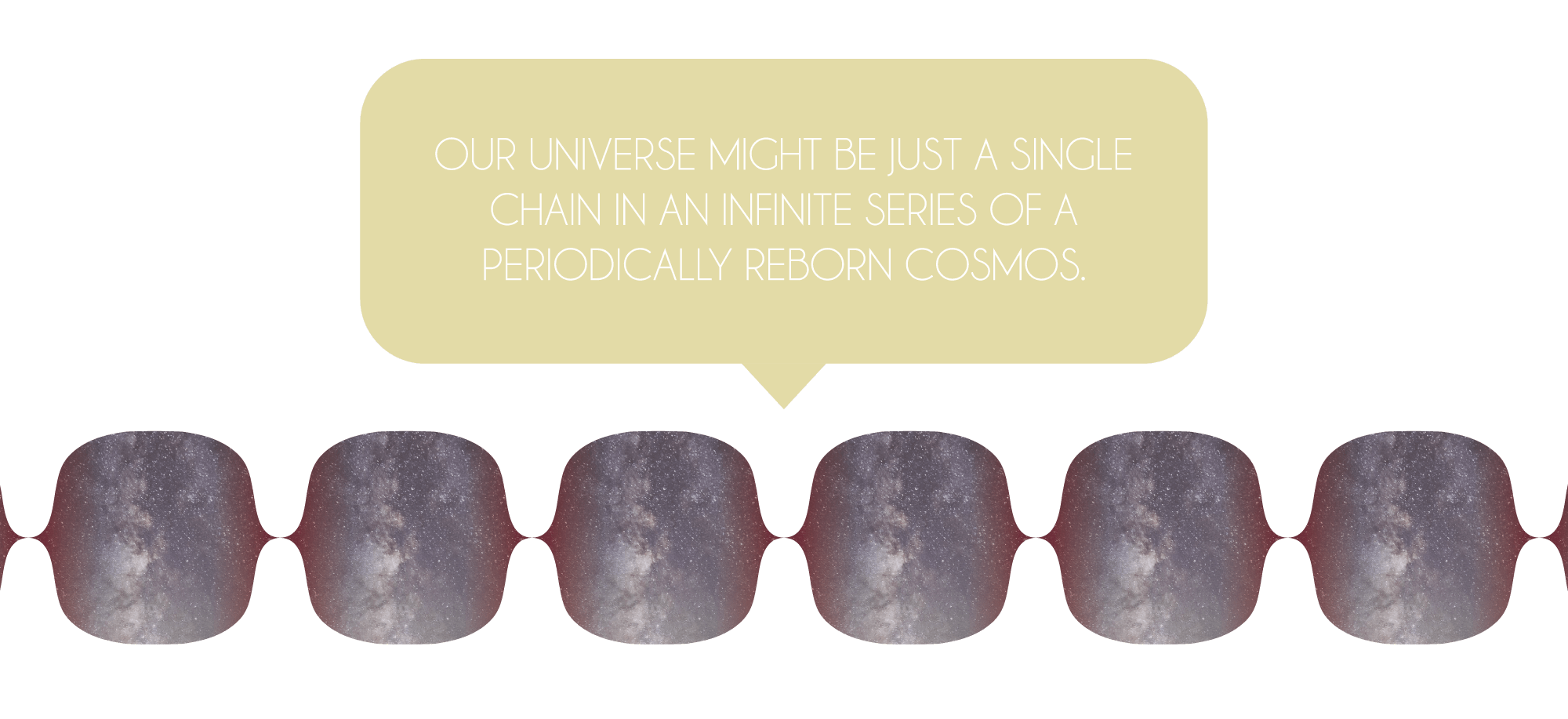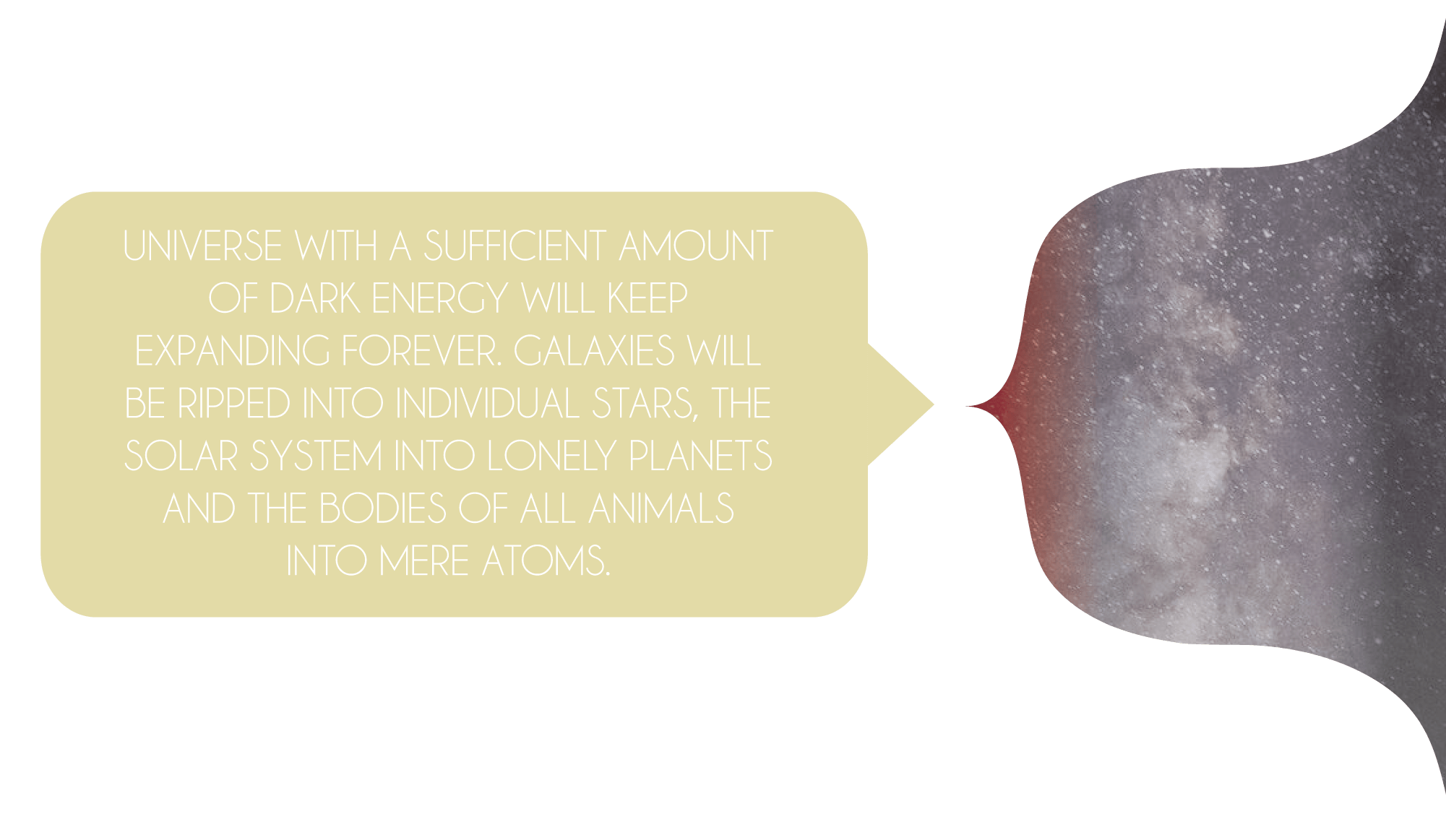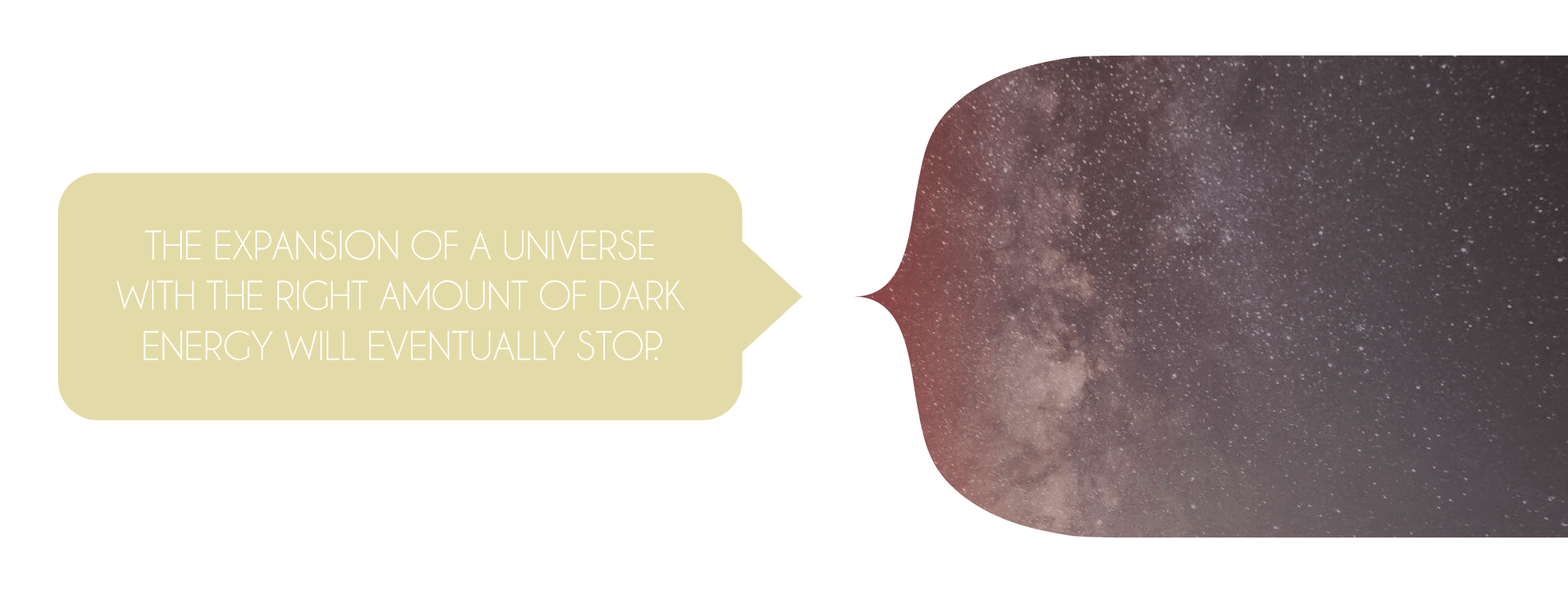INTRODUCTION
People used to think that the universe was static and unchanging. In other words, they thought it had always existed and always will. But this hypothesis was disproven when we found out that the universe had a beginning. The entire universe was created during the Big Bang from a single point, smaller than the nucleus of an atom. Today, billions of years after its birth, the universe does indeed seem to be static – planets serenely orbit their parental stars, and those in turn constantly encircle the centres of their galaxies. It may seem that it is going to stay this way forever. But reality is much sadder. With each passing second, we are approaching the inevitable end of our cosmos. And when it finally arrives, all humans will have been long dead and everything we have ever created long destroyed. But if we really wish to comprehend the downfall of the universe, we first need to focus on dark energy.
When scientists studied the expansion on the cosmos, they revealed an unexpected fact – the expansion is accelerating. This finding is really peculiar. According to previous presumptions, the expansion should be slowing down due to gravity. The fact that the opposite is true can only mean one thing – the expansion of the universe must be propelled by some kind of energy that is unknown to us. Energy that cannot be detected in classical ways and that has never been observed. Scientists have named this entity dark energy.
Today, not much is known about dark energy. However, it is all around us – each cubic centimetre of space-time contains its own dose of this mysterious entity, which acts against gravity and keeps creating new space-time between galaxies. And what is more, dark energy makes up about 70 percent of all the energy of the universe by today’s theories. 1
Dark energy has become even more fascinating when scientists realized a crucial fact – its amount determines the entire destiny of the universe.

 |
NEXT |
THE BIG CRUNCH
Ever since the very second it came into existence, the universe has been expanding. The distance between galaxies has been perpetually growing for billions of years – there are galaxies whose distance from you has increased by even a million kilometers while you have been reading this sentence. But what would happen if this expansion did not go on forever? If it suddenly stopped?
In a universe where there is not enough dark energy, this scenario is not only possible but downright inevitable. Without the resistance of dark energy, gravity simply would not have any counterpart and would have the final say. In such a universe, the gravitational attraction of individual galaxies would gradually slow down the expansion of the universe until it would eventually stop altogether. After that, everything would turn upside down – the universe would get into a shrinking phase. The shrinking would keep accelerating and the distance between galaxies would diminish. The temperature of the cosmos would increase to tremendous values just like at the beginning of time, and all galaxies would join into one. Eventually, the universe would die in the same way it was born – as a minuscule point of infinite density and infinite temperature, without any signs of its glorious history. The existence of everything would be erased and forgotten.

The most daring hypotheses even say that if the universe ever entered the shrinking phase, the arrow of time would reverse. All of those who have been long dead would gradually come back to life from their coffins and they would start getting younger with each day, fragmented glasses would rise and end up untouched back on tables, broken objects would spontaneously repair themselves. The entire life of every single organism would play backwards and ancient lizards would again see the light of day. Life would retreat back into the oceans and eukaryotic cells would disjoin back into prokaryotic. The first living organism would spontaneously disintegrate into simpler molecules. The Earth would be shredded into tiny fragments of cosmic dust and protons as well as neutrons would decay into quarks. The entire monumental universe would be squeezed into a single lonesome singularity.
And what would happen after the Big Crunch? Maybe nothing. The singularity could exist for eternity – completely static and unchanging. But perhaps something utterly different and much more interesting would happen – another Big Bang. A completely new universe might be created. It might be the same as ours, but it might also be entirely different.
And what is more, even our cosmos may not be the first one. It might have been created after a previous cosmos died. Our universe might be a mere link in an infinite chain of universes, past and future, each of them giving birth to the next one when dying. If this were true, the entire present universe would be just a meaningless dot in an infinite series of alternating Big Bangs and Big Crunches.


 |
 |
 |
PREVIOUS |
SHARE |
NEXT |
THE BIG RIP
But it seems that our universe is never going to experience the Big Crunch. Everything seems to point in the direction that our cosmos simply contains too little dark energy for it to be able to compete with gravity. A universe with a high amount of dark energy will reach a somewhat less poetic end.
As I have already mentioned multiple times, space-time constantly expands. Each second, millions of cubic metres of new space are created and are woven into existing space-time. Imagine that you are standing on the surface of a giant inflating balloon. While the balloon is expanding, all other objects on its surface are undoubtedly getting further and further apart from you, but their own size does not change. Our universe experiences a similar effect.
You may ask how it is possible that we do not feel the expansion of the cosmos. Should not all objects around us inexorably increase their distance from us? Should not all atoms of our own bodies run away in all direction as new space-time is created between them? They should, but there are three mighty forces that prevent them from doing so – gravity, strong interaction and electromagnetism.
Let us go back to our balloon analogy. How can we prevent all the other objects on the surface of the balloon from growing away? We grab them. For instance, if there was a different person with us on the balloon, we could just grab their hand and everything would be fine. As long as the force of our grip was greater than the friction between the bottom of our shoes and the surface of the balloon, we would undoubtedly stay together.
And electromagnetism along with gravity resist dark energy in a similar way. Our galaxy is not scattered through the entire universe, since the gravitational force between individual stars is greater than the force with which dark energy tries to separate them. Our bodies are not ripped into pieces, as the electromagnetic force between atoms and molecules is multiple times stronger than its counterpart in the form of dark energy.
But a universe whose fate is the Big Rip is not going to stay this way forever. In such a cosmos, the power of dark energy keeps perpetually increasing. At first, everything is going to stay the same, but remarkable things are going to happen after that.
Galaxies will be the first objects to feel the growing force of dark energy. It overpowers the gravitational attraction among the stars of the Milky Way, which will be mercilessly split from a single whole into billions of luminous dots millions of light years apart. The Solar System will come next. The Earth will be torn out of ours star’s gravitational field and will say goodbye to all the other objects of the Solar System.
Then, even electromagnetism will give up and all objects around us without exception will be changed beyond recognition. Our bodies will be ruthlessly ripped into individual protons and neutrons, which will escape in all directions and go on an eternal journey through space-time.

And eventually, even strong interaction will submit to the all-powerful dark energy. Composite particles will be ripped into elementary particles. The universe will become a gigantic wasteland. Its only inhabitants will be immensely lonely particles, each of them billions of light years away from its closest neighbours. The expansion of space will irreversibly go on forever.

 |
 |
 |
PREVIOUS |
SHARE |
NEXT |
THE HEAT DEATH
But what would happen to the universe if the amount of dark energy was just about right? If the balance between gravity and dark energy remained intact, so it would not be able to end by collapsing into a singularity or by ripping apart all of its citizens to billions of pieces? The expansion of such a universe would continue forever, but it would gradually slow down until it would become completely imperceptible. The size of the universe would therefore approach some predetermined value but would never reach it. Gravity would never overcome dark energy and dark energy would never beat gravity. Both forces would remain in an everlasting equilibrium.

At first sight it might seem that a universe with the right amount of dark energy would be spared from destruction and would exist forever. Unfortunately, that is not the case and the countdown towards the end of such a universe will eventually reach zero. End who is the architect of this countdown? All of us.
It could be said that today’s universe is quite an ordered place. Matter clusters into neat formations due to gravity, such as galaxies, stars, or planets. Everything has its given order. Stars obediently orbit the centers of galaxies, and planets revolve around their stars without any objections. However, it is not going to stay this way forever, since there is a peculiar variable called entropy.
We may say that entropy is something like disorderliness or chaos. Imagine salt in a vessel. Its entropy is small – the crystals of salt are calmly resting one next to another. But if we were to pour out the salt from the vessel, its entropy would increase rapidly – the crystals of salt would scatter all over the place and together form chaotic and unpredictable patterns.
This experiment with salt tells us a crucial thing about the cosmos – everything in the universe tends to go from an ordered state to a chaotic state. If you let go of a fragile object, it falls to the ground and shatters into small pieces. If you pour milk into a cup of coffee, it does not remain on its surface but starts spreading all over the volume of the cup in unpredictable patterns. It is not impossible that the milk spontaneously clumps into a neat ball or that spilled salt gathers into a beautiful pattern, but it is immensely improbable.
In other words, there are many more states in which a system is unordered than there are states in which it is ordered. That is why chaos will eventually always prevail over orderliness. This stream of events is inevitable, since it is inherently woven into the entire universe.
All the energy in the cosmos eagerly tries to get to a state of the highest possible entropy. Stars perpetually convert their mass into photons of light and bombard the whole universe with them. Our own bodies emit electromagnetic radiation in the infrared spectrum in all directions. The entire energy in the universe tends to spread evenly throughout the cosmos.
You may object that we can decrease the amount of chaos in the universe – after all, spilled salt can simply be put back in the vessel. Moreover, molten rocks in the Earth’s crust keep forming into immensely ordered structures with almost no entropy – minerals. Even our own bodies show low entropy, otherwise they would just gradually fall apart!
The problem with such reasoning is that it does not take into account the whole universe. Yes, we indeed can temporarily decrease the entropy of a negligible part of the cosmos, but we have to pay for it by increasing the chaos in a different part, so as a result the total entropy always increases.
Cooling magma in the Earth’s heart does form unprecedentedly orderly structures, but during this process a huge amount of heat is released into the surrounding space, which increases the total entropy of the universe. Our bodies are systems of steady entropy, but as a consequence they increase the disorderliness of everything around them. With each move, we inadvertently spread energy into space around us in the form of sound or heat – heat that chaotically escapes in all directions. Only by existing, we are inevitably increasing the entropy of the cosmos.
But we are not the only ones. Everything that happens in the universe, without any exceptions, increases its disorderliness. Every single burned piece of wood, every hydrogen atom that fused with a different atom in one of the billions of stars. Events that would decrease the chaos of the cosmos will simply not happen. Ever.
And now we are finally getting to the problem with entropy and the Heat Death of the universe. It is actually quite simple – entropy cannot increase forever. One day, it will not be able to grow anymore, and chaos will reach its maximum value. This event will be a true catastrophe for the universe. The formation of new stars will cease, the old ones will stop shining, because they will run out of fuel. Even all the protons inside atoms will not resist the persistent desire to increase the entropy of the cosmos and will fall apart into lighter particles. Human civilisation will be long gone by then. We have no chance of surviving in a universe that does not provide any usable energy. For many years, the very last citizens will remain in the cosmos as a reminder of its past glory – black holes. But even those will eventually evaporate into millions of photons.
The only thing that will remain is a universe that has reached the highest possible entropy. A universe where nothing will ever happen. A universe flooded with crowds of elementary particles that will cruise to and fro until the very end of time.

 |
 |
 |
PREVIOUS |
SHARE |
NEXT |
CONCLUSION
Nobody knows which of the scenarios will be fatal to our universe. Currently, the strongest candidate seems to be the Heat Death, but we have ruefully little information to predict the destiny of the universe with absolute certainty. But one thing is clear – there will once come a day that will be the last one.
Perhaps our cosmos is the only one and when it dies, everything that has ever existed will be gone. Infinite nothingness will rule forever. But perhaps our universe is just one of many, a mere grain in a gigantic multiverse, in which infinitely many universes are born each second, maybe the same as ours, maybe completely different. Who knows? We might never know the correct answer.
But if we are able to properly utilize our not negligible intellect and make the right decisions to preserve our species, I believe that some of our posterity will see the death of the universe with their own eyes. It would be an immense success to endure until the very end, to collaborate in order to withstand all trials our universe keeps presenting us with. But at the end, not even our intellect will save us. The death of the universe also means the death of humanity. It is not possible to exist outside of the filaments of space-time, outside of rigid physical laws. The universe has given us life, but eventually it will take life away from us.
It will take many billion years before the universe reaches its end. Until then we have a singular opportunity to explore its wonders. Because the more we learn about the cosmos, the more we can exploit its laws. What else can we do?

 |
 |
 |
PREVIOUS |
SHARE |
END |










